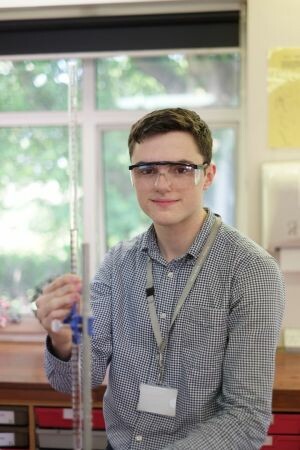Chemistry
Contact Teacher: Mr S Cooke, Team Leader KS4 and KS5 Science
Exam Board: AQA
Vision
The Science Faculty aims to help students to become knowledgeable, scientifically literate, and technologically capable problem solvers. We foster a spirit of inquiry, nurture our students’ curiosity and aim for all to have an appreciation of the beauty and wonder of science. We bring in current, relevant and real-world science into the classroom, to allow our students to become educated citizens capable of engaging in public discussions, comprehending and analysing global issues.
Science is taught at KS4 and KS5 by subject specialists as far as possible, with students having different teachers for their biology, chemistry and physics lessons. This allows for greater expertise in curriculum delivery, providing a rich experience for our students.
Chemistry Learning Journey
This is a visual representation of how students' knowledge and skills develop through the Chemistry Key Stage 4 and Key Stage 5 curriculum.
Bishop Luffa KS4/5 Chemistry Learning Journey
Why study Chemistry?
Chemistry is the central science in that it supports both biology and physics. The study of chemistry at advanced level is an excellent foundation for any science course at university. The subject leads to a host of career opportunities such as Research, Teaching, Medicine, Dentistry, Veterinary Medicine, Pharmacy, Chemical Engineering, Forensic Science, Environmental Science and many more.
Course details
Core content:
Physical chemistry (1 Atomic structure, 2 Amount of substance, 3 Bonding, 4 Energetics, 5 Kinetics, 6 Chemical equilibria and Le Chatelier’s principle, 7 Oxidation, reduction and redox equations, 8 Thermodynamics, 9 Rate equations, 10 Equilibrium constant for homogeneous systems, 11 Electrode potentials and electrochemical cells, 12 Acids and bases)
Inorganic chemistry (1 Periodicity, 2 Alkaline earth metals, 3 Halogens, 4 Properties of Period 3 elements and their oxides, 5 Transition metals, 6 Reactions of ions in aqueous solution)
Organic chemistry (1 Introduction to organic chemistry, 2 Alkanes, 3 Halogenoalkanes, 4 Alkenes, 5 Alcohols, 6 Organic analysis, 7 Optical isomerism, 8 Aldehydes and ketones, 9 Carboxylic acids and derivatives, 10 Aromatic chemistry, 11 Amines, 12 Polymers, 13 Amino acids, proteins and DNA, 14 Organic synthesis, 15 Nuclear magnetic resonance spectroscopy, 16 Chromatography)
 How the course is taught and assessed
How the course is taught and assessed
The A-level course is taught by a team of two teachers who split the specification between them, as recommended by the exam board. Practical assessments are carried out during the teaching of the relevant core content.
Paper 1
What’s assessed? - Inorganic chemistry , relevant physical chemistry topics (sections 1 to 4, 6 to 8 and 10 to 12) and relevant practical skills.
Written exam: 2 hours (short and long answer questions) 105 marks 35% of A-level
Paper 2
What’s assessed? - Organic chemistry, relevant physical chemistry topics (sections 2 to 6 and 9) and relevant practical skills.
Written exam: 2 hours (short and long answer questions) 105 marks 35% of A-level
Paper 3
What’s assessed? - Any content and any practical skills
Written exam: 2 hours 90 marks (40 marks of questions on practical techniques and data analysis, 20 marks of questions testing across the specification, and 30 marks of multiple choice questions) 30% of A-level
Entry requirements
Grade 6 or above in both Core and Additional Science at GCSE. Those who have followed the Triple Science route should have at least two 6 grades, including Chemistry. Grade 6 or above in GCSE Maths.
